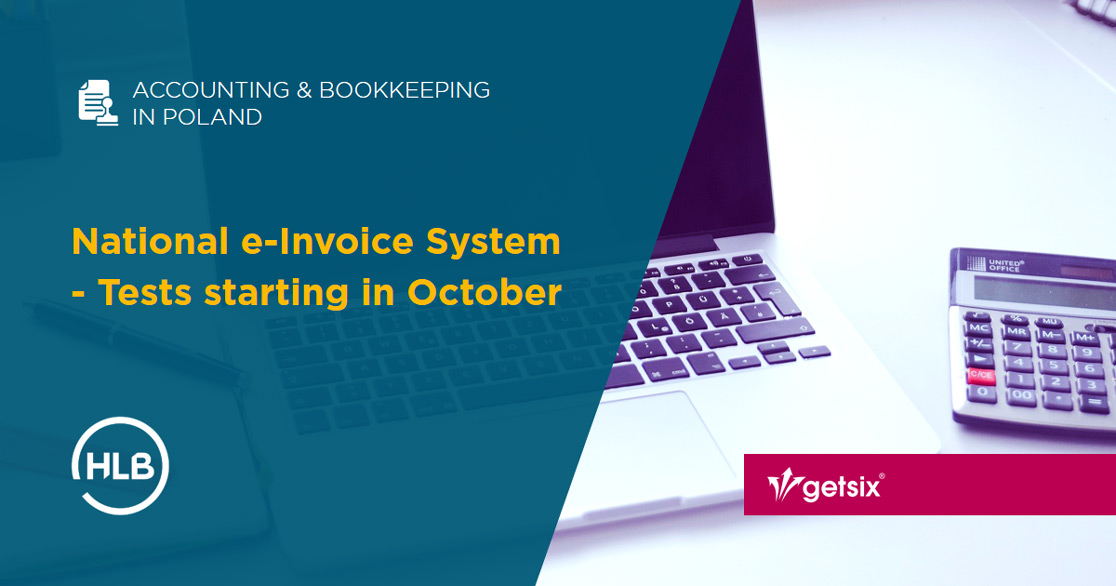National e-Invoice System – Tests starting in October
29 September 2021
29 September 2021

At the beginning of September, the Polish Parliament received a draft amendment to the VAT Act (Paper no. 1547 [PL]) concerning the introduction of the National System of e-Invoices (KSeF) as of 1 January 2022. However, according to information published by the Ministry of Finance, the system will be available in a test form from October onwards as to allow entrepreneurs to adapt their IT infrastructure before the changes come into effect.
According to the provisions of the draft, “structured invoices,” commonly referred to as e-Invoices, will be introduced on January 1, 2022, and their use will be voluntary for entrepreneurs at the beginning. Traditional paper documents and previously used electronic invoices will still remain a possible form of documenting sales. However, although the Act in its current form does not indicate any deadline obliging to use this solution, the information published on the website of the Ministry of Finance leaves no doubt that after a short test period, e-Invoice will become the only acceptable solution:
„In the first phase of e-invoice implementation, Polish entrepreneurs will use it voluntarily. It will operate as one of the permitted forms of documenting sales, alongside paper invoices and electronic invoices already present in economic transactions. In 2023, the use of e-invoices will become obligatory.”
Source: sejm.gov.pl [PL] (22.09.2021 r.)
In addition to generating sales invoices on the supplier side, KSeF is also to be used to receive invoices documenting purchases on the recipient side. Access to e-invoices will be possible only through the Ministry of Finance software, which means that both the issuer and the recipient of the e-invoice will have to be granted rights to use the system. Not surprisingly, the draft Act submitted to the Polish Parliament provides that the recipient will be able to decide whether they accept this form of document receipt. e-Invoices stored in the system will be kept there for 10 years and will not have to be archived in paper form.
KSeF will be available to any taxpayer or person authorised by the taxpayer (e.g. employee of an accounting office), after authentication in the system using
For non-individual taxpayers who will not be able to authenticate in any of the above-mentioned ways, authorizations can be granted by submitting a notice of authorization to use KSeF to the appropriate head of the tax office.
Access to an e-invoice placed in the system will be possible by providing:
To encourage entrepreneurs to use this solution, the Ministry of Finance points out a number of advantages, including:
However, some of the indicated benefits may also have a dark side, e.g. fast circulation of documents means that the date of receipt of the invoice will be identical to the date of its issuance, while the uniform appearance of the invoice will make it impossible to apply own graphic symbols and use visual identification, which, on the part of the issuer, may be important in terms of image, while on the part of the recipient may make it difficult to quickly identify documents and assign them to the correct service or purchase.
All data included in e-invoices will be immediately and automatically verified and forwarded to tax administration and control, which in practice will make it impossible to simplify invoicing or VAT settlements, and the system itself will require more extensive data than traditional invoices. KSeF may also limit or completely prevent cancellation of issued documents.
The bill, filed in the Polish Parliament, also introduces a number of changes related to invoicing – as part of the so-called “SLIM VAT 2 package”. The most important of these include:
For companies using their own accounting software, the introduction of e-invoices will require the integration of internal IT systems with the central system. In order to make it possible, the National Tax Administration [PL] has published on its website the working logical structure of the e-Invoice along with the documentation. The system is to be test-launched already in October this year.
It is worth bearing in mind that – for the period when the use of e-invoices will be optional – the Ministry has not indicated any legal regulations related to the consequences of malfunction of the system or its failure, and all comments in this regard made during consultations of the draft Act were met with the same response:
„It is envisaged that in the optional version, in the event of a possible failure, invoices will be issued bypassing the system as before.”
Source: Consultation report on the draft Act of 1 February 2021 amending the Value Added Tax Act and certain other acts.
If you have any further questions or require additional information, please contact your business relationship person or use the enquiry form on the HLB Poland website.
***
Download the brochures providing general information and outlining the services that are offered by HLB member firms.
Learn moreClick below for more detailed information regarding population, major towns and cities, language, religion and holidays in Poland.
Learn more